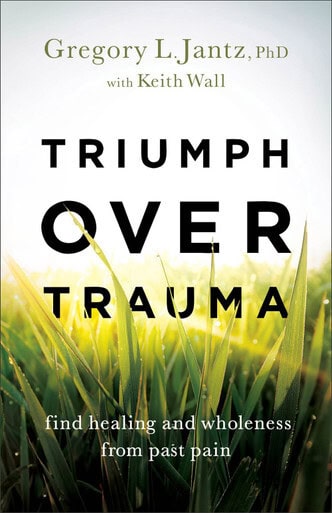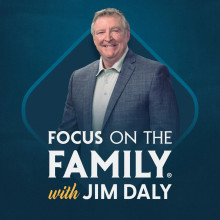Dr. Gregory Jantz: And so a healing point will be acknowledging the truth. “Okay, this happened, and I’m no longer gonna do self-destructive behaviors. I am going to find a way to walk through this.” I think that can feel overwhelming. For the person who’s been a victim of- of sexual abuse and s- significant trauma, for the person that has been through the unspeakable abuse, to think about, “How- how do I really face this?” And trauma ignored creates more trauma later.
Jim Daly: Yeah.
Dr. Jantz: It’s always worth walking through it.
John Fuller: Well, that’s Dr. Gregory Jantz, and he’s our guest again today on Focus on the Family with Jim Daly. Thanks for joining us. I’m John Fuller.
Jim: I’m really looking forward to day two of our discussion with Dr. Jantz. Uh, day one was great. If you missed it, uh, get the, uh, the app…
John: Mm-hmm.
Jim: … or go to the website, and listen to it that way. But there was so much good content setting up today. And last time, we talked about th- what is trauma, the difficulties of trauma, what trauma does to our brain, what kind of chemical response our body is giving, all wrapped in a spiritual understanding of God’s design.
John: Mm-hmm.
Jim: And today, we’re gonna talk about the things that people can do to overcome their trauma.
John: Mm-hmm, yeah, and Dr. Jantz is a popular speaker and author. Uh, he’s the founder of The Center, A Place of HOPE in Edmonds, Washington, and today, we’re gonna be talking about his book, Triumph Over Trauma: Find Healing and Wholeness from Past Pain. Uh, it’s an excellent resource, and we have copies of that here. Uh, give us a call, or stop by focusonthefamily.com/broadcast for all the details.
Jim: Dr. Greg, welcome back, day two.
Dr. Jantz: Very good to be with you. I’m glad that we can talk about the hope side of trauma.
Jim: Yeah, this is the high side of what we talked about yesterday. Uh, let’s start there. As we stated, uh, yesterday, there is a far more specific and detailed, clinical definition of trauma, but in general terms, give us a quick recap. What does trauma look like?
Dr. Jantz: Let’s make trauma very simple. It is something shocking probably has happened, either once or repeatedly, and now, you’re at a place, “I don’t feel safe.” I don’t feel safe emotionally. I don’t feel like I can trust people. Physically, my body may seem off.” Uh, trauma can create, uh, even inflammation in the body.
John: Mm.
Dr. Jantz: So my body physically may seem sick. I may be struggling with health issues.
John: Mm.
Dr. Jantz: Um, so trauma has a huge effect on the whole person.
Jim: You know, when I look at the- And sometimes, people will call or send us a note, John, about this intersection of psychology and scripture.
Dr. Jantz: Sure.
Jim: I would think after you’ve, you know, done your PhD in this area as a Christian, you can see even more closely how these things are related. It didn’t drive a wedge between your psychology and scripture, probably knitted so much of it together, did it?
Dr. Jantz: Well, it drives you back to scripture.
Jim: Yeah!
Dr. Jantz: And you go, “Oh! This all makes sense. It’s true!” Yeah.
Jim: Well, and I think, you know, again, I think it’s that reassurance for those that have a little bit of, uh, concern about psychology, there’s things in there that a…
Dr. Jantz: Oh, absolutely!
Jim: … non-Christian will whip into a different discussion, but a Christian psychologist, it really is the melding of two, really.
Dr. Jantz: Like any field, there’s gonna be some things in psychology that I’m not gonna go near.
Jim: Right. Right, perfect. And so, uh, you know, it’s just that understanding that God crated us, and learning how God created us…
Dr. Jantz: Yes.
Jim: … is a good thing!
Dr. Jantz: Mm-hmm, yes.
Jim: But let’s get into it. Uh, one of the steps to recovering and overcoming trauma is forgiveness. You know, a lot of people will walk through life not understanding how that formula works. I mean, “I can’t forgive my dad, who did this to me.”
Dr. Jantz: Mm-hmm.
Jim: Often, when I speak, uh…
Dr. Jantz: Right.
Jim: … I’ll have men in their 50s, 60s, 70s, come up to me in tears, saying, “How did you ever forgive your alcoholic father?”
Dr. Jantz: Mm-hmm.
Jim: And it’s so hard for me to answer, and I feel so inadequate because I never really felt, um, that he wounded me. I felt like he had demons he could not control.
Dr. Jantz: Sure.
Jim: And I- Y- You know, I- I think I just felt like he made bad choices, and he made them. I didn’t make them for him, but I- It’s a hard question for me to answer. “How did you forgive your father?” Um, so how- I guess, one, how do we know when we have forgiven?
John: Mm.
Jim: And then two, the power of that forgiveness?
Dr. Jantz: Yes, I think forgiveness as it looks- as we look at trauma, there’s self-forgiveness. You may have blamed yourself, you may have made some decisions. “I- I was a victim of abuse, and I chose a whole series of unhealthy relationships, I became an addict,” and you have- You look back and go, “Whoa!” So there’s a self-forgiveness for choices that I made. But then there’s a forgiveness- I- is it the abuser? Uh, is it forgiveness of, uh, poor choices from somebody else in the past? But if I don’t get to that crossroads, I’m gonna carry this my whole life. I don’t even realize how much unforgiveness has affected me. I’m told in the scriptures to put away all bitterness, and rage, and anger. I’m- I know I’m supposed to put that away, but the question is, “Okay, how do I do it?” There’s a decision I have to make. There’s a day of decision that says, “I don’t know how. I don’t know what this really means, but I’m going to make the decision today to begin to forgive.”
Jim: Mm.
Dr. Jantz: And you just need to say that out loud. “I’m making a decision today to begin to forgive.” Now, forgiveness doesn’t mean reconciliation. If you have a person who has abused you, and they’re- they’re still alive, that doesn’t mean I’m suggesting you go and have a relationship with them. It doesn’t mean, necessarily, there’s gonna be reconciliation. What it really means is, “I’m tired of the effects this has had in my life. I don’t want these effects anymore. I want to be free of that.”
Jim: Yeah. Now, you had an experience of having to forgive somebody that wasn’t- it wasn’t easy to do, uh, somebody related to The Center, I think.
Dr. Jantz: Oh, my goodness, when we first started out years ago, yes, yes, we had an employee that tried to injure us, and take everything that we had created, and- and…
Jim: That sounds monumental.
Dr. Jantz: I- I- It- It was, and- and- and I think my wife was probably better at forgiving initially than I was.
Jim: Yeah.
Dr. Jantz: I came to that place later on.
Jim: How do- It- Really, uh, sometimes, I’m going, because I’ll get challenged, you know?
Dr. Jantz: Yes.
Jim: “Did you really forgive your father?” And I’m going, “I th- I think I did. I don’t feel anything.” How do we know when it’s done, when you have forgiven?
Dr. Jantz: When it’s actually happened?
Jim: Yeah.
Dr. Jantz: Well, I want you to see it as, “I’m gonna need to v- probably verbalize this, and say it out loud.” Begin to see yourself as, “I’m an initiator of forgiveness. I’m not gonna carry bitterness. I’m not gonna take on offenses. If that person’s having a bad day, I’m not gonna absorb all their issues. I’m not gonna take it on.” So begin to see how you’re gonna handle hurt differently. How do I know that I’ve forgiven? Well, they’re not living rent-free in your brain, anymore, right?
Jim: Yeah, that front and center?
Dr. Jantz: Yes.
Jim: Yeah.
Dr. Jantz: I’m not wishing harm on them anymore.
Jim: Mm.
Dr. Jantz: Uh…
Jim: It’s kind of forgotten.
Dr. Jantz: They’re not in my f- conversation…
Jim: Mm-hmm.
Dr. Jantz: … all the time. (laughs) You know?
Jim: That’s good. Yeah.
Dr. Jantz: Um, I’m not using their name in vain. So, uh, you begin to feel free. You will feel emotionally lighter.
Jim: Mm.
Dr. Jantz: Now, you’re gonna need to ask God to help you do this. There is some forgiveness that’s so unbelievable that you know it can only be accomplished by, uh, the intervention of God’s love in your life. That’s the only way this is gonna happen, and I get that.
Jim: Yeah.
Dr. Jantz: And so if I’m forgiving, I can really be free in my relationships, and I don’t feel like I have to hurt others anymore.
Jim: Right.
Dr. Jantz: Uh, a person that really is high on criticism, listen to them. Do they have a spirit of criticism in their life? They may have some unforgiveness.
Jim: Oh, that’s interesting to connect those dots.
Dr. Jantz: Mm-hmm.
Jim: Um, what role does grief play in the forgiveness process? I mean, grief, I- I- I wouldn’t necessarily relate it to forgiveness.
Dr. Jantz: Hm.
Jim: But getting through grief gets you toward a path of forgiveness.
Dr. Jantz: Well, I have to process all the loss. There’s the loss of relationship, there’s a loss of maybe some things in my past that I regret. Um, grief also says, “I have to let go of this,” and as odd as it sounds, when I forgive, I’m letting go of pain. I’m letting go of toxic emotions. And so letting go of that, there is a- th- there’s a loss.
Jim: There’s no formula to grief, but it shouldn’t last very long, right? But I mean, it could be weeks, it could be months.
Dr. Jantz: Sure.
Jim: It should not be years, probably.
Dr. Jantz: Think of grief’s like waves.
Jim: Yeah.
Dr. Jantz: Um, it’s like, “Oh, I’m doing good. I feel like I’ve really let go of that. I’m processing my hurt. I’m grieving my loss.” And you go, “Oh, I’m doing well.” And then two days later, you may- Im- there may be somebody that reminds you of…
Jim: Mm.
Dr. Jantz: … a person that hurt you, and so you get rem- kind of that recall again. So be careful. You don’t have to pick it up again, but it’s a reminder, “No, I’m- I’m letting this go.”
Jim: Yeah, you used a metaphor in the book, which I heard this long ago. I think it was a book calling, uh, something like, Fly Like a Bison, or something.
Dr. Jantz: Oh, yes. Yeah, yeah!
Jim: I can’t remember the exact title. But in there, that’s the first time I had seen that analogy, and you use it in your book.
Dr. Jantz: Sure.
Jim: Uh, “Be a bison, not a cow.”
Dr. Jantz: Well, when there’s fear there’s a thunderstorm, okay, the cows, they run the other way.
Jim: They run away from the storm…
Dr. Jantz: They run away.
Jim: … which is coming after them.
Dr. Jantz: Yes.
Jim: Right.
Dr. Jantz: Yeah, bison are different. Bison are interesting. They come together as a herd, and they go into the storm. They face it. So what I’m saying is yes, you need to face the forgiveness, the unforgiveness. You’ve gotta go through this storm, but you will go through, and you will be stronger. Your relationships will be stronger. You’re gonna feel like s- there was a breakthrough in God’s love for you. You’re gonna feel it at a deeper level. So don’t run away from this.
Jim: Yeah.
Dr. Jantz: Don’t-
Jim: And the idea that the bison as they do that, they get through the storm more quickly ’cause a cow runs with the storm. It stays over them.
Dr. Jantz: There you go.
Jim: Yeah, I mean, that’s an interesting metaphor.
Dr. Jantz: It is.
Jim: Let me speak to that regarding Christians, particularly, and pain in this life, et cetera.
Dr. Jantz: Yes.
Jim: You know that wonderful Psalm that says He’s close to the brokenhearted and saves those crushed in spirit.
Dr. Jantz: Right.
Jim: It sounds like, uh, a prerequisite for coming to know the Lord, that, you know, the Lord is searching for that soul who is broken because His compassion is there. And something about this life, I don’t think people get through this life without trauma, without being broken.
Dr. Jantz: Yes.
Jim: And something will get you, even if you have a Cinderella, golden touch, whatever word you wanna use. Eventually, someone around you will hurt, you will hurt. Um, it happens. That’s what this life is about. So I think the question is w- how do we process that as Christians, so that it’s healthy and beneficial to our understanding of this life, rather than a grievance that we have with God?
Dr. Jantz: We know in- in the human l- life, that there is gonna be hurt. None of us will b- be outside of that. There will be. Um, it’s what we do with that, and it’s an opportunity to see that God really is not only walking beside us, but God is with us. And so my encouragement when there’s been hurt, part of the hope of it is understanding God’s presence in your life, and there’s an element of faith here. You’re gonna need to walk forward, believing by faith that God’s Word is true, He is with me, and there is a redemption side. There’s a side where I grow stronger. There’s a side that I feel like God is using me now. There’s… No pain is wasted.
Jim: Hm. Yeah.
Dr. Jantz: And let’s look at that. Um, I’m much more empathetic, and understanding, and hopefully, patient for those who have gone through significant trauma.
Jim: And you’ve heard so much as a counselor.
Dr. Jantz: Yes, you do.
Jim: My goodness.
Dr. Jantz: Yes. But I also have seen the turnaround story, and, uh, part of what w- we see is God is changing lives for good, for a purpose.
Jim: Mm.
Dr. Jantz: And folks who walk through their pain, they don’t see it at the time, but part of their redemption and healing is God is going to be using that, and you are gonna help others.
Jim: You know, Greg, that seems to be such a conflict when we go through trauma. “Where was God?”
Dr. Jantz: Yes.
Jim: “Why, God? Why did you let me go through that?” It can become this loop that we play, until we r- we resolve that somehow.
Dr. Jantz: Mm-hmm.
Jim: Um, for the person that has that kind of hard heart, if I could say it that way, toward the Lord, what do you recommend? One thing for me is go to God. He can take it. You can- You can tell Him exactly what you’re feeling ’cause He already knows your heart.
Dr. Jantz: I would tell God exactly how I’m feeling, and then I would thank Him, even if I don’t feel it. “Thank you for your presence. Thank you that you are going to see me through this.” So move it from a, “Why,” and- and this is easier said than done, okay? Move it from a, “Why,” to, “Thank you, Lord, that you’re gonna see me through this. I don’t see the end yet,” heh, “But thank you that your Word is true. I’m gonna keep going.”
Jim: You know, I’m thinking of Paul. I’ve thought a lot about this lately, Paul in jail.
Dr. Jantz: Mm-hmm.
Jim: And he sang, and he consoled the jailers, who, it seems to imply they were sympathetic that Paul shouldn’t be jailed, and he was, l- like, you know, reassuring them, “Hey, if God didn’t want me here, I wouldn’t be here. Don’t worry about it.” I mean, that’s the impression I get, the paraphrased version.
Dr. Jantz: Right. Right.
Jim: And even when…
Dr. Jantz: Right.
Jim: … the angel broke his chains and those around him, and they were free to get out of jail, he consoled that jailer to say, “It’s okay, we’re gonna stay.” (laughs)
Dr. Jantz: Yes.
Jim: I mean, it- it’s just interesting that Paul had a completely different attitude than I would have.
Dr. Jantz: Mm-hmm.
Jim: And I want more of that Paul attitude. What did he have that most of us don’t?
Dr. Jantz: Well, I think he might have put some focus on praise.
Jim: (laughs)
Dr. Jantz: Praising God. And- And during pain, and during times… You’re- If you’ve been traumatized, you’re in- you’re in shock, uh, your systems have shut down, and it’s hard to make a decision, but I want you to thank God that He is with you. You don’t see it, you may not feel it, um, but you will.
Jim: No matter your circumstances.
Dr. Jantz: No matter your circumstances.
Jim: Mm-hmm. You can’t say, “But Greg, you don’t know what I’m going through.”
Dr. Jantz: No matter the circumstance.
Jim: That’s right.
John: Mm. Well, we are here to help. Uh, this is Focus on the Family with Jim Daly, and we’re talking with Dr. Gregory Jantz today. Uh, he’s got this excellent book, Triumph Over Trauma: Find Healing and Wholeness from Past Pain. Also, uh, we do have caring Christian counselors here, and it would be a privilege to, uh, meet you at that point of pain and struggle. If you’re not able to quite go where Dr. Jantz is suggesting right now, uh, call us. Let us maybe part of that journey. Our number is 800, the letter A, and the word FAMILY, uh, 800-232-6459. We’ve got details at focusonthefamily.com/broadcast.
Jim: Greg, let me ask you this. Uh, Bill and Pam Farrel have been on the program, and we always enjoy when they come on. And they wrote a book called Men Are Like Waffles, and Women Are Like Spaghetti, and they’re kind of talking about the physiology between the two genders…
Dr. Jantz: Yes.
Jim: … and the fact that women are so connected in their brain connectivity. I mean, they- they’re just-
Dr. Jantz: It’s- It’s true.
Jim: They’re list-making. They’re thinking of 14 things.
Dr. Jantz: Uh-huh. Uh-huh.
Jim: And men are like, “I cannot do that. I…” You know? And it- we have more limitations in some way, but when you’re looking at this, especially for the anxiety and then the triumphing over trauma, y- y- both are struggling in this area, but just because of that brain connectivity for a woman, does she struggle more so with all the things that are attached to the trauma?
Dr. Jantz: I think one of the things is she may even be a better historian of things that have happened. Uh, sometimes the memory recall, right down to what I was wearing, or… The- The recall can be different than it could be for a- a- a male brain.
Jim: Mm-hmm.
Dr. Jantz: So- But we all are processing, just in different ways. We’re all gonna cope with it, maybe in little, different ways.
Jim: In that- In that context, what’s the physical downside of this tr- of being in trauma, lingering in trauma, not forgiving? What do we feel physically?
Dr. Jantz: The longer we stay…
Jim: Yes.
Dr. Jantz: … with the trauma in our life, like… Picture this active in your body. We do know that trauma will create inflammation. Inflammation is the, if you will, the seed bed for disease to start, for, um, us to set ourselves up for some physical complications.
Jim: Mm-hmm.
Dr. Jantz: We know that trauma, you may suffer from headaches unexplained, a lot of digestive issues.
Jim: Yeah.
Dr. Jantz: And so the healing and the trauma, or healing of trauma, will- will affect the whole body.
Jim: Oh, yeah.
Dr. Jantz: And you will feel different. You’ll feel different physically.
Jim: Won’t sleep as well.
Dr. Jantz: So yes.
Jim: Mm-hmm, yeah.
Dr. Jantz: Um, sleep’s a big one.
Jim: Yeah.
Dr. Jantz: And anybody with trauma, uh, may be afraid to sleep because of dreams, or you may find yourself going long periods of time trying to stay awake, and not fall asleep ’cause I’m afraid of what a dream might be.
Jim: W- When we’re feeling depressed or anxious, negative thoughts hit us so hard. I mean, that’s what we’re describing.
Dr. Jantz: Yes.
Jim: And then, you know, then it’s this loop of y- you’re not meeting expectations, you’re not good enough, and so it goes, the hamster wheel. What are some ways we can reset or reframe the way we think about ourselves, about our circumstances, about others?
Dr. Jantz: Well, one of the things I want you to look at is renewing your mind. What am I doing-
Jim: That sounds big.
Dr. Jantz: I know. I know. But l-
Jim: (laughs) Doesn’t it?
Dr. Jantz: I’ll- I’ll give you a personal example. I have it in- I have it right here, a personal example.
Jim: Okay.
Dr. Jantz: Take the old-fashioned, three by five card. Three by five card.
Jim: There you go.
Dr. Jantz: I want you to put- Well, m- I have three here that have different verses. These are in different suit pockets. Um, but I want you to go outside, I want you to go for a walk, um, and I want you to read whatever verse it is that is renewing your mind. I want you to say it out loud. “D- Do not be anxious about anything, but in every situation, by prayer and petition, present my request.” Okay. And I want you… Just a practical thing. I know we don’t use three by five cards very often.
Jim: No, I think it’s great.
John: You can find them almost anywhere.
Dr. Jantz: I just happened to have them with me. (laughter)
John: They’re pretty cheap.
Dr. Jantz: But I want you to say God’s Word out loud…
John: Mm.
Dr. Jantz: … to renew your mind.
Jim: Yeah, that’s good.
Dr. Jantz: And do that several times throughout the day. I want you to change and create different sleep hygiene. I used to work in sleep research, so sleep and mental health is very- of great interest to me. Uh, we are in a sleep epidemic. People’s sleep has n- never been so disrupted as it is now. And, uh, I want you to do the same thing each night. Get off the device b- an hour before bed, okay? (laughs)
Jim: Yeah.
Dr. Jantz: Um, I want you to have a super dark bedroom. I want you to do the same things each night, um, you know, the pre-sleep routine. But I want you to start building a different framework for sleep. I want the last thing going in your mind to be a- a praise of something that God’s at work, thankfulness.
Jim: Mm.
Dr. Jantz: But retool your sleep habits.
Jim: H- Thankfulness, I would think the byproduct of that is peace.
Dr. Jantz: Peace.
Jim: Yeah.
Dr. Jantz: Yeah.
Jim: Which helps you sleep. (laughter) Right?
Dr. Jantz: Yes.
Jim: Just sets your mind at peace. You know, when you look at that, Greg, you think of the garden and what God created for Adam and Eve, and then you think of sin and chaos entering in the world. This is all about that kind of spiritual and literal physical combat between chaos and God’s peace, right?
Dr. Jantz: Yes, creating order.
Jim: That’s the whole thing, creating order out of…
Dr. Jantz: Mm-hmm.
Jim: … disorder, out of chaos.
Dr. Jantz: Yes.
Jim: And God never intended for us to actually live in that, and that is the description of Heaven, no more tears, no more fear, no more… That’s- That’s what we were created for.
John: Yeah.
Jim: And that’s why it feels so disjointed in this life. It feels dark at times…
Dr. Jantz: Mm-hmm.
Jim: … and not going the way it should go, and there’s that hole in our heart, that only God can fill.
Dr. Jantz: Yes.
Jim: Right?
Dr. Jantz: And we have to recognize there are things that are simply outside of our control.
Jim: Hey, let me move to reclaiming your power.
Dr. Jantz: Okay.
Jim: And you had a great example of that from an NBA player. I think his name was Monty Williams…
Dr. Jantz: Oh, yes.
Jim: … who was a good illustration of this. What happened to Monty and his family?
Dr. Jantz: Well, um, his wife, uh, with a couple of kids were coming home from an event, and they were in a tragic automobile accident, and she w- h- his wife was killed.
Jim: Mm-hmm.
Dr. Jantz: T- True story.
Jim: No fault of hers?
Dr. Jantz: No, no fault of hers. A person actually was on, uh, drugs that them high speed, head on. Um, two of his kids in the vehicle survived, but he lost his wife.
Jim: Mm.
Dr. Jantz: And how do you recover from that? Um, and he had to turn that… Uh, y- you think of that, talk about trauma. Talk about tragedy. Talk about… He could be so resentful and angry at that other driver, who was, uh, o- on drugs.
Jim: W- E- Even justified.
Dr. Jantz: Yes!
Jim: Mm-hmm.
Dr. Jantz: Oh, justified, absolutely!
Jim: You know, that word is powerful, but you feel justified…
Dr. Jantz: Yes. Yeah.
Jim: … in that anger.
Dr. Jantz: Yeah.
Jim: And so w- where did he go with it?
Dr. Jantz: He made the decision where, uh, he began praying for that f- uh, family, the other family.
Jim: Hm.
John: Hm.
Dr. Jantz: And, uh, part of a sign of forgiveness is can you pray for that person that’s injured you? Can you pray God would bless them? Could you pray for that family, uh, that was represented, uh, that, where a- a life was taken? So- So he made a decision.
Jim: Yeah.
Dr. Jantz: That’s a big decision, but he was not gonna f- focus on the resentments. He was gonna pray for that other family and use this for good.
Jim: That reminds me, remember the, uh, killing at the school in, uh, Amish country, I think it was.
John: Ah, yes.
Jim: Remember they- the families…
Dr. Jantz: Mm-hmm.
Jim: … that were impacted came together, and…
Dr. Jantz: Yes.
Jim: … expressed forgiveness, I mean, like, the next day.
Dr. Jantz: Yeah.
Jim: And I- that had to be a step of faith for them.
Dr. Jantz: Huge.
Jim: To say, “We know what’s happened. We know we’ve lost a daughter…”
Dr. Jantz: Mm-hmm.
Jim: “… or son,” whatever it may have been.
Dr. Jantz: Right.
Jim: But man, I remember how many news outlets carried that…
Dr. Jantz: Mm-hmm.
Jim: … and talked about the puzzlement of that.
Dr. Jantz: Mm-hmm.
Jim: It really shocked the world, right?
Dr. Jantz: Right.
Jim: That they could come out and show a spirit of forgiveness.
Dr. Jantz: Yes.
Jim: But they talked more about that than really the incident, and, uh, what a demonstration of God’s, uh, expression.
Dr. Jantz: Yeah, uh, giving mercy to somebody that’s created great harm.
Jim: Who doesn’t deserve it.
Dr. Jantz: Who doesn’t deserve it.
Jim: From our perspective, right?
Dr. Jantz: I agree.
Jim: What does it mean to pursue post-traumatic growth? I mean, I think that’s a- a flavor of it right there, what we talked about, but how do you pursue post-traumatic growth?
Dr. Jantz: Yes.
Jim: I- Those all sound like words that shouldn’t be in the same sentence.
Dr. Jantz: Yeah, w- we call it PTG, post-traumatic growth. Okay, so the trauma happened. I’m- I’m dealing with it, but how do I keep myself on a trajectory of continuing to grow? What- How am I gonna keep making myself better? How am I gonna use the scars to help others? How am I gonna become stronger? How am I gonna improve in my own self-care? Um, what does God want me to do?
Jim: Hm.
Dr. Jantz: And so post-traumatic growth says, “I’m making a decision. I’m gonna keep growing, and I’m gonna have a greater impact because of my growth.”
Jim: Mm-hmm. I think leading to that, this will be kind of the summary question. Why is faith in God so critical as a component to recovering from trauma?
Dr. Jantz: Because we will see God reveal Himself through this at some point, and so when I say “faith,” you go, “Okay, I don’t know I have a faith.” That’s okay. Keep working on exercising the faith. You’re going to see it, and God is going to take something, and you said it earlier, Jim, that was intended for evil. God’s gonna use it for good, so hang on. Don’t give up on that.
Jim: Yeah.
Dr. Jantz: Yeah, the reason I can say that is I’ve seen it in so many different people’s lives.
Jim: Yeah.
Dr. Jantz: I know it’s true.
Jim: That’s so good. Yeah, at the- at the moment, it may not f- feel right, even.
Dr. Jantz: No, no.
Jim: It may not seem right, but it will be right.
John: Mm.
Jim: And people will understand that when they get to that, “Aha!” moment.
Dr. Jantz: There is another side to trauma.
Jim: Yeah.
Dr. Jantz: Mm-hmm.
Jim: And this has been so good, Greg. Thanks for spending the time to write the book…
Dr. Jantz: Yeah.
Jim: … to do what you are doing. Congratulations on 40 years…
Dr. Jantz: Thank you.
Jim: … celebrating The Center’s work, and all the- all the help you’ve provided.
Dr. Jantz: Yeah.
Jim: That’s a wonderful way to spend your life.
John: Mm-hmm.
Jim: Yeah. So let me speak to you. Um, I hope it’s as clear as can be. We want you to be healthier. If you’re in a place where you haven’t forgiven, you’re feeling the effects of trauma, you’re not sleeping, all the things that we’ve covered, uh, get in touch with us. Uh, first of all, we can give you a copy of Greg’s great book, Triumph Over Trauma, and if we can do that in such a way that you can help the ministry for any amount, we’ll send you the book a- as our way of saying thank you. If you can’t afford it, we’re a Christian ministry. We want- We’re gonna be there for you, and we’ll trust others will cover the cost of that. So simply get in touch with us, and start that journey. We also have caring Christian counselors you can talk to, and John’ll give you the way to contact them.
John: Mm-hmm, yeah, we’re a phone call away, 800, the letter A, and the word FAMILY, 800-232-6459. Um, just call, and ask to speak to a counselor, and we’ll set up a time for one of them to give you a call back. And, uh, we’ll make sure that it’s a good fit for that phone consultation. They’ll talk with you. They’ll hear you out, uh, probably offer to pray with you, and- and suggest a local resource if, uh, if you wanna continue having ongoing, uh, counseling conversations. Again, 800, the letter A, and the word FAMILY, and then, uh, if you’d like to donate, you can use that same number, or we’ve got all the details at focusonthefamily.com/broadcast. And thanks for joining us for Focus on the Family with Jim Daly. I’m John Fuller, inviting you back, as we once again help you and your family thrive in Christ.






















